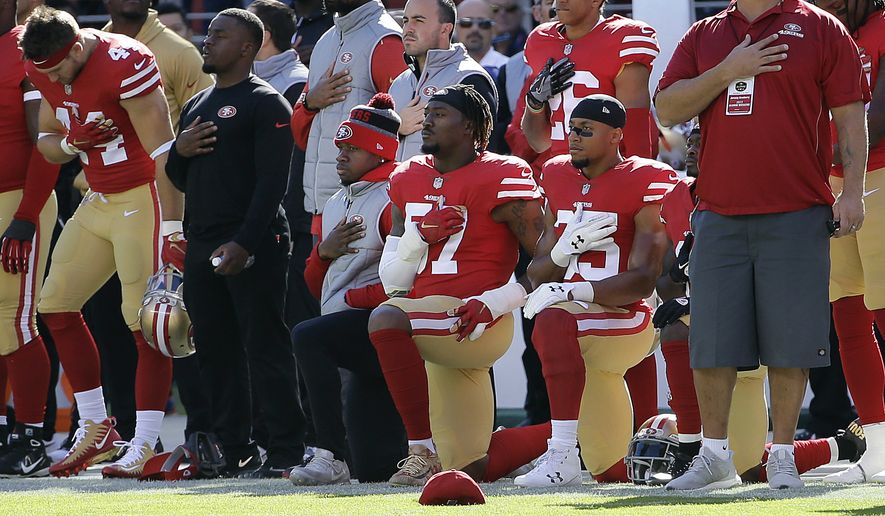The NFL has taken a beating over players kneeling during the national anthem, but a closer examination shows that the protests are less a story of the league as a whole and more a tale of two liberal cities: San Francisco and Seattle.
On any given Sunday, the vast majority of those refusing to stand for “The Star-Spangled Banner” play for the San Francisco 49ers and Seattle Seahawks, teams nestled in famously left-wing locales and led by owners who sought to keep Donald Trump out of the White House.
That doesn’t include blips like Sept. 25, which saw nearly 200 players kneel in reaction to President Trump’s suggestion that owners should fire protesters, or Oct. 29, when all but 10 of the Houston Texans took a knee after owner Bob McNair said the NFL “can’t have the inmates running the prison.”
But those days were distinct exceptions. Most Sundays look more like Nov. 5, when 11 of the 15 players who sat or knelt for the national anthem wore the uniforms of the Seahawks or 49ers, according to the ESPN tally.
Tae Rutherford, who runs a Seattle Seahawks fan page on Facebook, said she’s not surprised.
“I feel like San Francisco and Seattle are the most accepting places ever,” said Rutherford.
Along with being located in famously blue cities, the teams have something else in common: owners who aren’t Trump fans.
Microsoft billionaire Paul Allen, owner of the Seattle Seahawks, contributed nearly $30,000 to Hillary Clinton’s presidential bid, and another $24,300 to the Democratic National Committee, while San Francisco 49ers owner Jed York chipped in $1,000 to elect Mrs. Clinton.
Another key factor for both teams has been the leadership of player-activists in the locker rooms.
In San Francisco, safety Eric Reid picked up this year where former quarterback Colin Kaepernick left off, leading the take-a-knee protests on the field and emerging as the NFL’s unofficial player spokesman on the issue.
That’s apparently fine with the 49ers faithful. “California fans either are on board with the protest or they respect their right to protest,” said Solomon Burke, a season ticket-holder who runs a fan page.
In Seattle, defensive end Michael Bennett has been similarly outspoken, telling reporters that “I just want to use my platform to continuously speak on injustice,” and spearheading the protests on the sideline.
He and five other Seahawks sat on the bench last weekend during the national anthem, while one player took a knee.
Rutherford said the importance of Bennett’s role cannot be overstated.
“If Michael Bennett didn’t sit, I don’t think anyone else would have,” she said. “He’s a known player for Seattle, a Pro Bowler, and if he didn’t take the first steps with sitting down, I don’t think anyone else would have had the courage to, to be honest.”
Despite Seattle’s famous liberalism, fans at first weren’t thrilled with the players kneeling for the anthem.
“The first couple of weeks after Michael Bennett started sitting, a lot of people didn’t go to the games, a lot of people who went to the games booed and threw stuff,” said Rutherford, who runs the Seahawks for Life site. “But I think they’re so used to it by now that they don’t pay attention to what’s happening.”
The Seattle team has followed up by launching the Seahawks Players Equality & Justice for All Action Fund, aimed at “addressing equality and justice,” while the 49ers partnered with law-enforcement unions to call for a ban on firearms accessories like “bump stocks,” armor-piercing bullets, and silencers.
The San Francisco organization plans to spend $500,000 on the effort, launched after the Oct. 1 Las Vegas mass shooting.
Remove San Francisco and Seattle from the equation, and only a handful of player protesters are left.
New York Giants defensive end Olivier Vernon has consistently taken a knee, and Oakland Raiders running back Marshawn Lynch — a former Seahawk — always sits.
Three Miami Dolphins players took a knee last weekend after spending the previous few weeks in the locker room.
Coach Adam Gase had asked players to stay in the locker room or tunnel rather than protest, but relaxed the rule after they reportedly told him that keeping off the field for the anthem was interfering with their game preparation.
The NFL has struggled this year with declining ratings and ticket prices, which has been attributed in part to fan outrage over the take-a-knee protests.
“I went to the home opener. There was a flag ceremony on the field, and Eric Reid was behind me kneeling as I was helping hold the flag,” said Solomon, who roots for the 49ers but lives in New Orleans. “I didn’t hear a lot of boos, but the stadium wasn’t exactly packed.”
The Bay Area may be liberal, but Solomon said he thinks the uproar, combined with the team’s 0-9 record, has hurt the team’s game-day attendance.
“It’s hard to sell tickets on top of the fact that they’ve sucked for the last two years,” Burke said. “It’s just one more controversy that doesn’t help.”
• Valerie Richardson can be reached at vrichardson@washingtontimes.com.




Please read our comment policy before commenting.